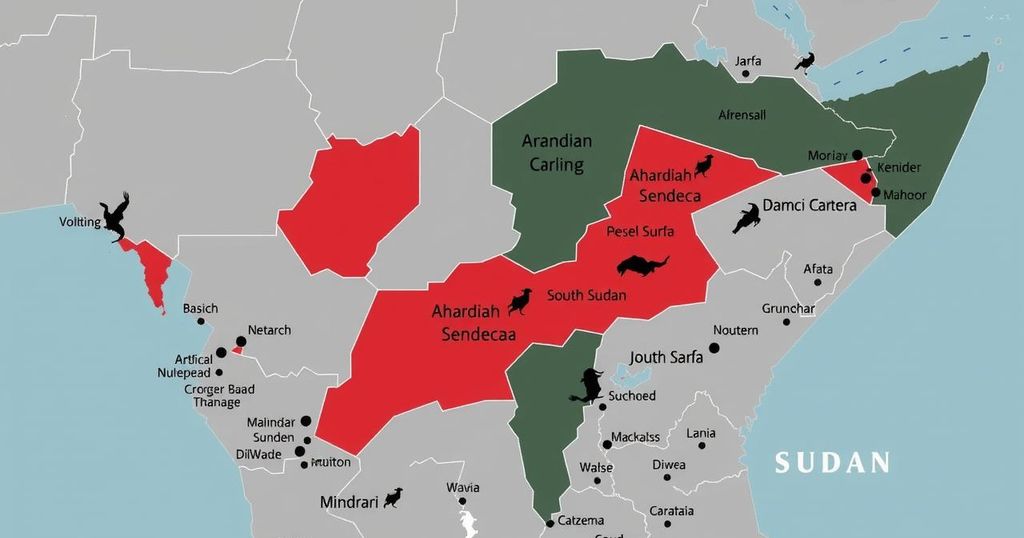South Sudan Faces Crisis as Peace Deal Threatened by Political Unrest

South Sudan faces potential civil war due to the arrest of Riek Machar, threatening a fragile peace deal from 2018. Ethnic divisions and governmental instability exacerbate the crisis, drawing international concern. Global voices are urging for de-escalation and reconsideration of Machar’s detention to prevent further violence.
South Sudan, the world’s youngest country, is facing the potential collapse of a fragile peace deal that ended years of conflict and has raised fears of civil war. The nation achieved independence from Sudan in 2011 following decades of unrest but has been unable to maintain stability, often being divided along ethnic lines. It suffered a civil war in 2013, followed by another in 2016, until a ceasefire was instituted in 2018.
Currently, South Sudan is led by a coalition government including President Salva Kiir and his rival, Riek Machar. Tensions reignited with Machar’s recent arrest, prompting the SPLM/A-IO to declare that this action jeopardizes the peace agreement made with Kiir. The SPLM/A-IO indicated that this move could precipitate a return to conflict. CNN has reached out to the SPLM/A-IO for their perspective on possible outcomes but awaits a response.
Machar’s arrest is part of broader unrest following the dismissal of several SPLM/A-IO leaders and military cooperation with Uganda against local militia forces. The SPLM/A-IO condemned what they described as Ugandan military aggression against civilians. In a letter to the UN Secretary-General, Machar stated that Uganda’s involvement breaches the peace agreement.
Since gaining independence, South Sudan has not held national elections. The current governance structure is rooted in a power-sharing agreement designed to end a prior five-year civil war that resulted in approximately 400,000 fatalities. The political landscape remains deeply divided between Kiir’s Dinka tribe and Machar’s Nuer ethnic group. Recent violence in Nasir, involving clashes between government forces and the Nuer militia known as the White Army, has exacerbated fears of destabilization.
Authorities accused Machar of inciting rebellion and attempting to thwart potential elections, reinforcing claims of undermining peace. Information Minister Michael Makuei stated that Machar would face scrutiny along with his party for allegedly promoting division. The SPLM/A-IO has yet to respond to these claims.
International responses to the current crisis have included warnings from the UN, asserting that the situation is becoming increasingly precarious. Secretary-General Antonio Guterres emphasized the need for de-escalation, remarking that the circumstances are eerily reminiscent of previous civil conflicts. A coalition of Western embassies has also urged President Kiir to reconsider Machar’s detention and called for a ceasefire.
Given the instability, the US and UK embassies have advised their citizens to evacuate while they can. The African Union plans to send a delegation to Juba to assist in de-escalating the situation, while a Kenyan envoy held discussions with Kiir concerning resolutions.
The World Bank’s recent assessments paint a grim picture of South Sudan, indicating pervasive violence, poor governance, and heightened humanitarian crises. A staggering portion of the population lives in extreme poverty. Despite this dire context, South Sudan continues to host a significant number of refugees from neighboring conflict zones. The UN has cautioned that South Sudan is on the brink of severe crisis, urging the global community not to overlook its plight.
In summary, South Sudan is on the verge of potential renewed conflict following the arrest of Riek Machar, which threatens the fragile peace established in 2018. This sociopolitical turmoil arises from long-standing ethnic divisions, governmental instability, and international concern regarding human rights. As global entities call for de-escalation and a reconsideration of Machar’s arrest, the situation remains precarious. The international community is urged to maintain focus on South Sudan, emphasizing the need for sustained peace efforts and humanitarian support.
Original Source: www.cnn.com






